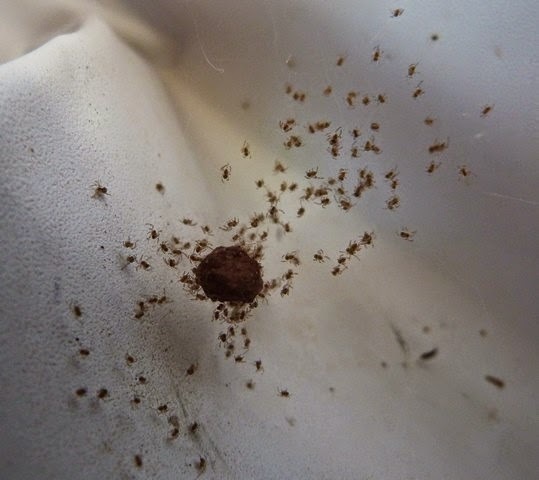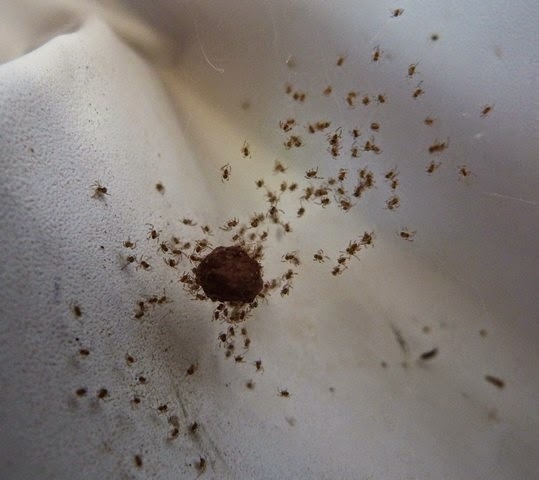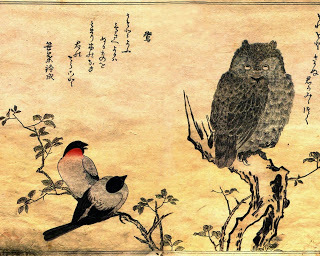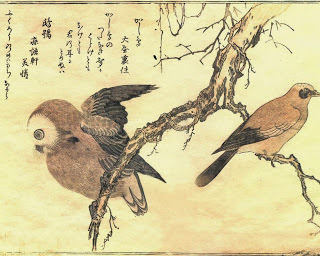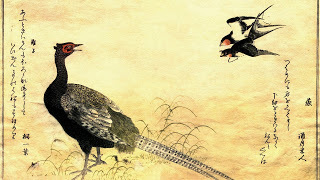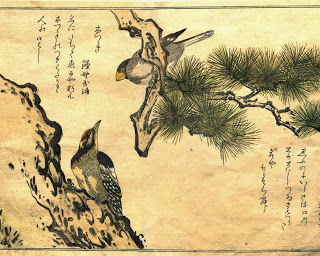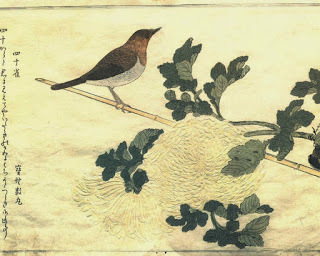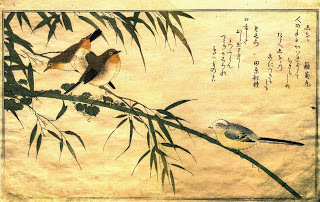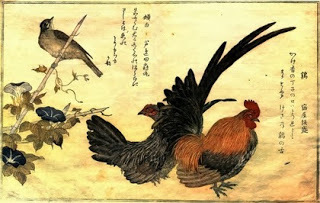Gordon Grice's Blog, page 24
August 29, 2014
Wildlife Classics: A Tsavo Leopard
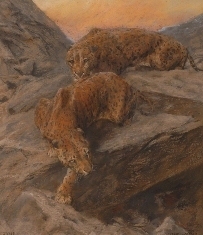 from The Man-Eaters of Tsavo by JH Patterson
from The Man-Eaters of Tsavo by JH PattersonWe were never long without excitement of some kind or another at Tsavo. When the camp was not being attacked by man-eating lions, it was visited by leopards, hyenas, wild dogs, wild cats, and other inhabitants of the jungle around us. These animals did a great deal of damage to the herds of sheep and goats which were kept to supply the commissariat, and there was always great rejoicing when a capture was made in one of the many traps that were laid for them.
Leopards especially are most destructive, often killing simply for pleasure and not for food: and I have always harboured animosity towards them since the night when one wantonly destroyed a whole herd of mine. I happened at the time to have a flock of about thirty sheep and goats which I kept for food and for milk, and which were secured at sundown in a grass hut at one corner of my boma. One particularly dark night we were startled by a tremendous commotion in this shed, but as this was before the man-eaters were killed, no one dared stir out to investigate the cause of the disturbance. I naturally thought that the intruder was one of the "demons," but all I could do was to fire several shots in the direction of the hut, hoping to frighten him away. In spite of these, however, it was some time before the noise died down and everything became still again. As soon as it was dawn I went to the shed to see what had happened, and there, to my intense anger, I found every one of my sheep and goats lying stretched dead, on the ground with its throat bitten through. A hole had been made through the frail wall of the shed, and I saw from this and from the tracks all round that the author of the wholesale slaughter had been a leopard. He had not eaten one of the flock, but had killed them all out of pure love of destruction.
I hoped that he would return the next night to make a meal; and should he do so, I determined to have my revenge. I accordingly left the carcases exactly as they lay, and having a very powerful steel trap -- like an enormous rat-trap, and quite strong enough to hold a leopard if he should put his foot in it -- I placed this in the opening into the shed and secured it by a stout chain to a long stake driven into the ground outside. Darkness found everyone in my boma on the alert and listening anxiously to hear the noise the leopard would make the moment he was caught in the trap. Nor were we disappointed, for about midnight we heard the click of the powerful spring, followed immediately by frantic roaring and plunging. I had been sitting all evening with my rifle by my side and a lantern lighted, so I immediately rushed out, followed by the chaukidar (watchman) carrying the lamp. As we approached the shed, the leopard made a frantic spring in our direction as far as the chain would allow him, and this so frightened the chaukidar that he fled in terror, leaving me in utter darkness. The night was as black as had been the previous one, and I could see absolutely nothing; but I knew the general direction in which to fire and accordingly emptied my magazine at the beast. As far as I could make out, he kept dodging in and out through the broken wall of the goat-house; but in a short time my shots evidently told, as his struggles ceased and all was still. I called out that he was dead, and at once everyone in the boma turned out, bringing all the lanterns in the place. With the others came my Indian overseer, who shouted that he too wanted revenge, as some of the goats had belonged to him. Whereupon he levelled his revolver at the dead leopard, and shutting his eyes tightly, fired four shots in rapid succession. Naturally not one of these touched the beast, but they caused considerable consternation amongst the onlookers, who scattered rapidly to right and left. Next morning a party of starving Wa Kamba happened to be passing just as I was about to skin the leopard, and asked by means of signs to be allowed to do the job for me and then to take the meat. I of course assented to this proposal, and in a very few minutes the skin had been neatly taken off, and the famishing natives began a ravenous meal on the raw flesh.

Published on August 29, 2014 09:00
August 27, 2014
Free stuff on Facebook!
I’m teaming up with Audible.com to give away five free copies of my new audiobook, The Red Hourglass: Lives of the Predators, on Facebook. All you have to do for your chance is like or comment on the post over there. We’ll put all the names in a hat and draw for the prizes in one week. More about the audiobook (regularly priced at $17.46) is here:
(And if you’re not into Facebook, don’t worry; we’ll be doing another giveaway in the coming weeks exclusively for readers of this blog.)

Published on August 27, 2014 06:00
August 22, 2014
August 16, 2014
The Wasp's Victim
D'Arcy rescued this paralyzed fellow from a wasp, which presumably meant to use it as fodder for her young.








Published on August 16, 2014 09:43
August 15, 2014
Spiders by Dee
Published on August 15, 2014 09:01
August 8, 2014
NEW: The Red Hourglass on audio
Audible.com has just unveiled the audio edition of The Red Hourglass. It's narrated by Keith Sellon-Wright (Madmen, Parks and Recreation, and too many other shows and movies to list). The New York Times called The Red Hourglass "first-rate, unsentimental writing about nature and about the ways that human beings try to cope with the most terrible cruelties that nature offers up." Now you can listen to it on your commute, during your workout, or even while relaxing in bed. . . although some readers have told me they didn’t sleep well after trying that last option.
Published on August 08, 2014 09:00
August 1, 2014
Centipede Eats Mouse
In The Centipede Feeds: Predator Porn on Youtube, writer Mark Dery tackles the horror and disgust our multi-legged friends sometimes produce in humans. The video above is among several impressive images included with his essay, which surveys the topic from the book of Leviticus to Youtube comments. Personally, I never found centipedes disgusting. . . until I watched the video. Nevertheless, if anybody's wondering what to get me for Christmas. . . .
PS--What's up with those pushy pill bugs?

Published on August 01, 2014 09:00
July 26, 2014
Millipedes in Strange Light
A lot of nature is invisible to us--to me, at least; possibly you have some sort of Kryptonian vision. Anyway, these millipedes have bright colors to warn off predators--but some of those colors lie outside our range of vision. They're filmed here under ultraviolet light to help our poor human eyes. Without the special lighting, you'd see them as yellow and black.


Published on July 26, 2014 09:00
July 19, 2014
Utamaro's Birds
Published on July 19, 2014 09:00
July 12, 2014
Flash
Warning: The only animals in this story are the human kind.
1Anybody who’s been to college knows a lot of the learning happens outside the classroom—over cinnamon rolls and coffee at Johnny T’s, in four a.m. rambles around Theta Pond, on the lawn before Low library or in dorm rooms dominated by massive stereo speakers; at honky-tonks or prayer meetings. I’m talking about myself, obviously. When it came to my own true identity, my best lesson started at Willie’s Saloon.
2“Hey, man. You want to go to Willie’s with us?” That was Phil, slouching up in a trench coat. We all had trench coats, because some other guy in the dorm was going back to Australiaand didn’t want to lug his gear on the plane.
“I don’t know,” I said. “I’m playing spades.” The cards fluttered through a shuffle and clattered through a cut. “Who’s playing at Willie’s?”
“Guy named Garth Brooks.”
“Never heard of him.”
“He’s country, but he’s good.”
“How can he be good if he’s country?” And to the other spadesters, I said, “You guys want to go see this yutz?”
There was laggardly talk of cover charges and getting up for work in the morning.
“If we go, who’s going to bust this nil?” one spadester said.
“I hate country,” I said.
“Suit yourself,” Phil said, and slouched away.
Yet I found myself, minutes later, striding down the Strip, hands in my pockets against an April wind, one of the other spadesters striding beside me and chattering through shivering jaws. We passed Coney Island, where cowboys clacked pool balls behind neon beer signs.
“Where you guys going?” said a stranger. He must have weighed four hundred pounds.
“Willie’s, to hear Garth Brooks,” said the spadester.
“Who’s Garth Brooks?”
“A country guy.”
“Country sucks, man. You guys know any place to eat around here?”
“How about Yer Mother’s?” I said.
“What did you say to me?”
“Not yours,” said the spadester. “It’s a restaurant. Farther down.”
We slipped into Willie’s—no turning back now, if I wanted to lose the stranger—and it was too hot as soon as we did. We sloughed our trench coats. Phil waved us over to his table, where he sat, as usual, with the best-looking women in the place. One of them shrunk from me as I sat down, like a slug from salt.
“He don’t look like a country guy,” said the spadester.
The singer growling from the stage was a sixtyish African-American in a beret.
“Got my wires crossed,” Phil said. “Garth was last night.”
3I’ll tell you what I had against country, in case you want to know.
In the summer when I bussed tables at the Oklahoman Restaurant back in my hometown, KGYN played in the background. Country and the ag report. I longed for the fall, when I’d have the freedom of college again--when, if I really wanted, I could drive around all night listening to Rock 100 the KATT, and Boston would blossom from the speakers to mingle with the darkness and dashboard light. In fact, my college town was mapped by my memory of the songs I’d heard there—the Piggly Wiggly parking lot glimpsed in clouded October light to the sound of Def Leppard’s “Too Late for Love”; the dorm basement where my friends sang Robert Palmer hits, substituting vulgar lyrics; the Grandy’s restaurant where the Thompson Twins’ “Lay Your Hands” trickled out of the PA and a certain young lady laid her hands on mine and told me God was trying to tell us something.
Sure, you could hear rock and roll back home if you tried. But it wasn’t naturally in the air. I didn’t even hate my jobs, or, as I discovered in later years, my hometown. But I would go to my weekday job landscaping at the hospital, and there I’d be in 110 degrees of Guymon, Oklahoma, hoeing the grass that got out of its bounds and dreaming of Iron Butterflies and Rolling Stones. And Sunday afternoons it seemed to me, as I wiped the lipstick traces from somebody else’s tea glass over the Oklahoman’s stainless-steel sink, that the blistered air was full of Buck Owens, a language I didn’t care to speak.
4Waitresses and bouncers wore shirts said IT’S OK, I KNOW BILL. Bill was the real owner of Willie’s, and all the drunks claimed to know him when they wanted favors. Some of us went to the pool table; Phil and his lady went out to what seemed the single square yard of dance floor. It was me and the spadester left at the table, and he was saying something about his engineering final. Loud music, chatter all around. My ear was hurting from the cold wind, even though I was prickling with sweat now. Somewhere in the chatter I found out the singer’s name was Flash Terry. He was playing blues with a flavorful guitar and a voice like buttered gravel. Blues wasn’t really my thing, but it sounded more like rock than country did.
Phil and his lady came back, and the spadester fell into a shouting conversation with someone or other. I got wrapped up in Flash Terry’s music. His guitar made me stop and listen. I felt suddenly as if some other version of me living in a distant country had been wounded, and I was hearing the report of it.
It wasn’t just me. At the next table, the fraternity guys who had been shouting out requests like “Theme from Scooby-Doo” a minute ago were rapt. The chatter hadn’t stopped altogether, but it was dying out, like brushfires under rain. I supposed he’d had the crowd mostly with him before, but now Flash Terry had turned the corner into communion.
“Thrill is gone,” Flash Terry sang. “It’s gone away for good.” I’d heard the song somewhere before, but there was a new kind of silence in its phrases. A pool cue clicked against the ball. I actually heard the ball hitting the bumper. Then there were no more pool sounds until Flash had finished telling us about his broken heart.
5A couple of years later, Tracypulled out a CD and set it on the table in our apartment, cautiously, as if it were a bomb.
“I bought Garth Brooks,” she said.
“The country guy?”
“He’s country, but he’s good.”
“How can he be good if he’s country?”
“Country can be good.”
“Isn’t this the guy that used to play around Stillwater?”
“He went to school here, but he’s big now.”
She put the disk on. I went back to my homework, which I had somehow decided to take seriously after we got married. I tuned Brooks out. After a while I heard him singing something about rodeo. Somewhere in there, I heard the word latigo, which I hadn’t heard in a while. My memory groped for a definition but somehow ended up telling me about the time I sat in the pickup with my dad watching the bronc riders; and I got to go off to the concession stand by myself for the first time ever and buy us two cherry Shastas and get a nickel back from my quarter. And people at the rodeo said “just fine and you” when my dad asked how they were, and they said the whole phrase as if it were one word, and for the first time I noticed that a man says he’s fine even if he isn’t.
“Hell of a song,” I said. “Even if it is country.”
“I pooh-pooh your categories,” she said.
“I went to see him once.”
“How was he?”
“It didn’t work out. I saw Flash Terry instead.”
“That’s funny. Jane invited us to see Flash Terry at Willie’s tomorrow. I never heard of him.”
EpilogGarth Brooks has continued his rather decent career. In 1994, as if to prove to me once and for all that music is music and genre doesn’t matter, he teamed with the rock band Kiss on what I consider the definitive version of their old hit “Hard Luck Woman.”
Tracy and I went to Willie’s that night and had a great time dancing to Flash Terry. His version of “Thrill Is Gone” prompted me to buy a copy of B. B. King’s, which I like almost as much. Flash died in 2003, the year the Oklahoma Music Hall of Fame inducted him.
I loosened up and learned to like me some country—and some blues, some jazz, some other stuff. It’s been said that blues and country are really black and white versions of the same thing. I just know that somehow the mingling of them brought me back to my roots. I still listen to Spirit and the Stones, but here’s Flash Terry bookmarked on my Youtube, and here’s Hank Williams on my shelf, and Johnny Cash and Bobby Gentry and so on. And here, between Blue Oyster Cult and Patsy Cline, is that same Garth Brooks CD Tracy brought home all those years ago.
Originally published in Oklahoma Today.
1Anybody who’s been to college knows a lot of the learning happens outside the classroom—over cinnamon rolls and coffee at Johnny T’s, in four a.m. rambles around Theta Pond, on the lawn before Low library or in dorm rooms dominated by massive stereo speakers; at honky-tonks or prayer meetings. I’m talking about myself, obviously. When it came to my own true identity, my best lesson started at Willie’s Saloon.
2“Hey, man. You want to go to Willie’s with us?” That was Phil, slouching up in a trench coat. We all had trench coats, because some other guy in the dorm was going back to Australiaand didn’t want to lug his gear on the plane.
“I don’t know,” I said. “I’m playing spades.” The cards fluttered through a shuffle and clattered through a cut. “Who’s playing at Willie’s?”
“Guy named Garth Brooks.”
“Never heard of him.”
“He’s country, but he’s good.”
“How can he be good if he’s country?” And to the other spadesters, I said, “You guys want to go see this yutz?”
There was laggardly talk of cover charges and getting up for work in the morning.
“If we go, who’s going to bust this nil?” one spadester said.
“I hate country,” I said.
“Suit yourself,” Phil said, and slouched away.
Yet I found myself, minutes later, striding down the Strip, hands in my pockets against an April wind, one of the other spadesters striding beside me and chattering through shivering jaws. We passed Coney Island, where cowboys clacked pool balls behind neon beer signs.
“Where you guys going?” said a stranger. He must have weighed four hundred pounds.
“Willie’s, to hear Garth Brooks,” said the spadester.
“Who’s Garth Brooks?”
“A country guy.”
“Country sucks, man. You guys know any place to eat around here?”
“How about Yer Mother’s?” I said.
“What did you say to me?”
“Not yours,” said the spadester. “It’s a restaurant. Farther down.”
We slipped into Willie’s—no turning back now, if I wanted to lose the stranger—and it was too hot as soon as we did. We sloughed our trench coats. Phil waved us over to his table, where he sat, as usual, with the best-looking women in the place. One of them shrunk from me as I sat down, like a slug from salt.
“He don’t look like a country guy,” said the spadester.
The singer growling from the stage was a sixtyish African-American in a beret.
“Got my wires crossed,” Phil said. “Garth was last night.”
3I’ll tell you what I had against country, in case you want to know.
In the summer when I bussed tables at the Oklahoman Restaurant back in my hometown, KGYN played in the background. Country and the ag report. I longed for the fall, when I’d have the freedom of college again--when, if I really wanted, I could drive around all night listening to Rock 100 the KATT, and Boston would blossom from the speakers to mingle with the darkness and dashboard light. In fact, my college town was mapped by my memory of the songs I’d heard there—the Piggly Wiggly parking lot glimpsed in clouded October light to the sound of Def Leppard’s “Too Late for Love”; the dorm basement where my friends sang Robert Palmer hits, substituting vulgar lyrics; the Grandy’s restaurant where the Thompson Twins’ “Lay Your Hands” trickled out of the PA and a certain young lady laid her hands on mine and told me God was trying to tell us something.
Sure, you could hear rock and roll back home if you tried. But it wasn’t naturally in the air. I didn’t even hate my jobs, or, as I discovered in later years, my hometown. But I would go to my weekday job landscaping at the hospital, and there I’d be in 110 degrees of Guymon, Oklahoma, hoeing the grass that got out of its bounds and dreaming of Iron Butterflies and Rolling Stones. And Sunday afternoons it seemed to me, as I wiped the lipstick traces from somebody else’s tea glass over the Oklahoman’s stainless-steel sink, that the blistered air was full of Buck Owens, a language I didn’t care to speak.
4Waitresses and bouncers wore shirts said IT’S OK, I KNOW BILL. Bill was the real owner of Willie’s, and all the drunks claimed to know him when they wanted favors. Some of us went to the pool table; Phil and his lady went out to what seemed the single square yard of dance floor. It was me and the spadester left at the table, and he was saying something about his engineering final. Loud music, chatter all around. My ear was hurting from the cold wind, even though I was prickling with sweat now. Somewhere in the chatter I found out the singer’s name was Flash Terry. He was playing blues with a flavorful guitar and a voice like buttered gravel. Blues wasn’t really my thing, but it sounded more like rock than country did.
Phil and his lady came back, and the spadester fell into a shouting conversation with someone or other. I got wrapped up in Flash Terry’s music. His guitar made me stop and listen. I felt suddenly as if some other version of me living in a distant country had been wounded, and I was hearing the report of it.
It wasn’t just me. At the next table, the fraternity guys who had been shouting out requests like “Theme from Scooby-Doo” a minute ago were rapt. The chatter hadn’t stopped altogether, but it was dying out, like brushfires under rain. I supposed he’d had the crowd mostly with him before, but now Flash Terry had turned the corner into communion.
“Thrill is gone,” Flash Terry sang. “It’s gone away for good.” I’d heard the song somewhere before, but there was a new kind of silence in its phrases. A pool cue clicked against the ball. I actually heard the ball hitting the bumper. Then there were no more pool sounds until Flash had finished telling us about his broken heart.
5A couple of years later, Tracypulled out a CD and set it on the table in our apartment, cautiously, as if it were a bomb.
“I bought Garth Brooks,” she said.
“The country guy?”
“He’s country, but he’s good.”
“How can he be good if he’s country?”
“Country can be good.”
“Isn’t this the guy that used to play around Stillwater?”
“He went to school here, but he’s big now.”
She put the disk on. I went back to my homework, which I had somehow decided to take seriously after we got married. I tuned Brooks out. After a while I heard him singing something about rodeo. Somewhere in there, I heard the word latigo, which I hadn’t heard in a while. My memory groped for a definition but somehow ended up telling me about the time I sat in the pickup with my dad watching the bronc riders; and I got to go off to the concession stand by myself for the first time ever and buy us two cherry Shastas and get a nickel back from my quarter. And people at the rodeo said “just fine and you” when my dad asked how they were, and they said the whole phrase as if it were one word, and for the first time I noticed that a man says he’s fine even if he isn’t.
“Hell of a song,” I said. “Even if it is country.”
“I pooh-pooh your categories,” she said.
“I went to see him once.”
“How was he?”
“It didn’t work out. I saw Flash Terry instead.”
“That’s funny. Jane invited us to see Flash Terry at Willie’s tomorrow. I never heard of him.”
EpilogGarth Brooks has continued his rather decent career. In 1994, as if to prove to me once and for all that music is music and genre doesn’t matter, he teamed with the rock band Kiss on what I consider the definitive version of their old hit “Hard Luck Woman.”
Tracy and I went to Willie’s that night and had a great time dancing to Flash Terry. His version of “Thrill Is Gone” prompted me to buy a copy of B. B. King’s, which I like almost as much. Flash died in 2003, the year the Oklahoma Music Hall of Fame inducted him.
I loosened up and learned to like me some country—and some blues, some jazz, some other stuff. It’s been said that blues and country are really black and white versions of the same thing. I just know that somehow the mingling of them brought me back to my roots. I still listen to Spirit and the Stones, but here’s Flash Terry bookmarked on my Youtube, and here’s Hank Williams on my shelf, and Johnny Cash and Bobby Gentry and so on. And here, between Blue Oyster Cult and Patsy Cline, is that same Garth Brooks CD Tracy brought home all those years ago.
Originally published in Oklahoma Today.

Published on July 12, 2014 09:00


